Entrepreneurship & Small Business Management: SMEs Impact Analysis
VerifiedAdded on 2022/03/03
|24
|5446
|22
Report
AI Summary
This report provides a comprehensive analysis of entrepreneurship and small business management, focusing on various entrepreneurial ventures such as start-ups, acquisitions, franchises, joint ventures, and public-private partnerships. It distinguishes between individual, corporate, and public sector entrepreneurship, highlighting their similarities and differences. The report also examines the significant impact of SMEs on the UK economy, including employment and poverty reduction, and delves into the crucial aspects of an entrepreneurial mindset, including characteristics, skills, and personality traits. Furthermore, it evaluates the environments that foster and hinder entrepreneurship, considering the influence of background, experience, and personal characteristics on entrepreneurial success. This detailed exploration offers valuable insights into the dynamics of entrepreneurship and small business management.

Entrepreneurship and small business management
Name:
Professor:
Institution
Course:
Date:
1
Name:
Professor:
Institution
Course:
Date:
1
Paraphrase This Document
Need a fresh take? Get an instant paraphrase of this document with our AI Paraphraser
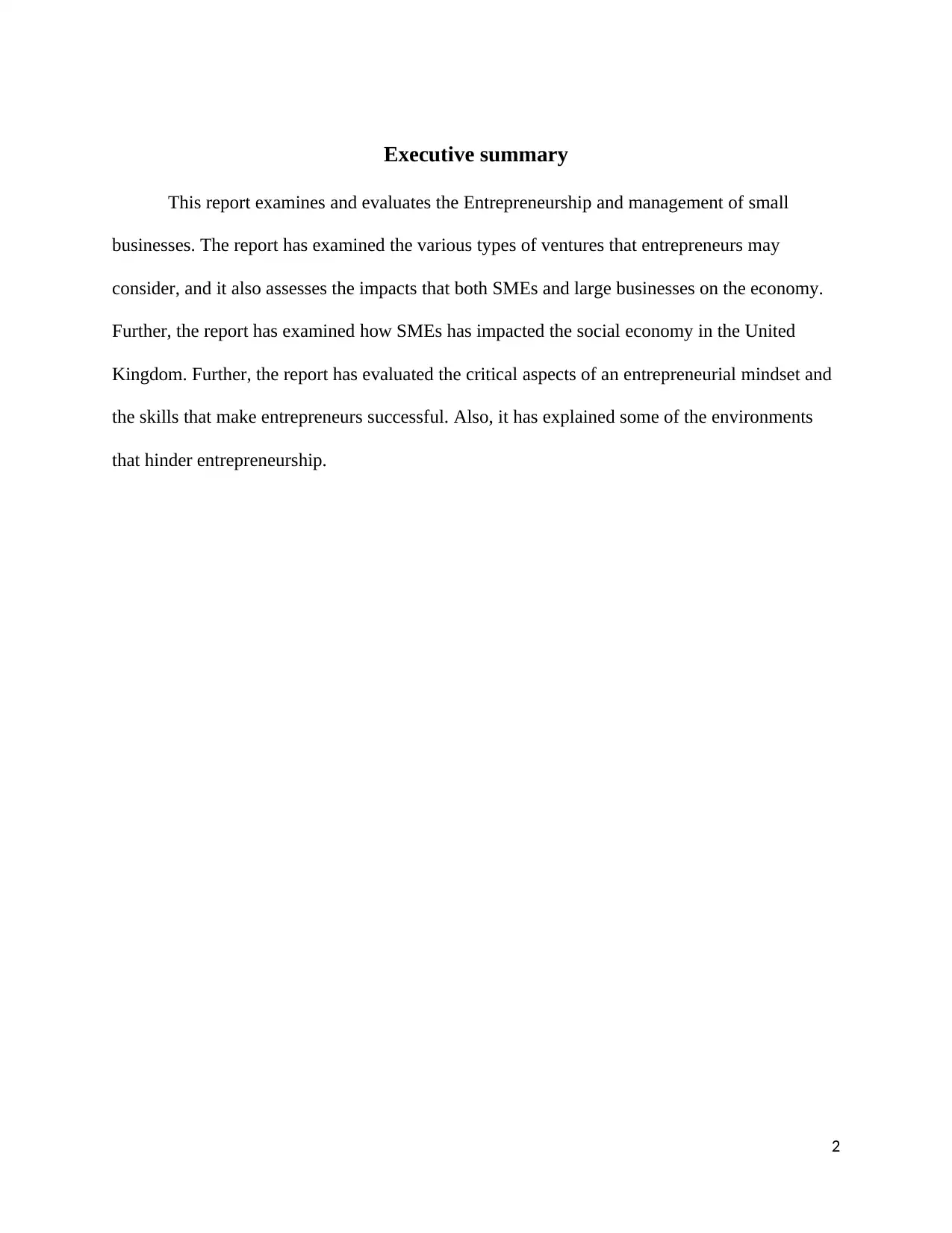
Executive summary
This report examines and evaluates the Entrepreneurship and management of small
businesses. The report has examined the various types of ventures that entrepreneurs may
consider, and it also assesses the impacts that both SMEs and large businesses on the economy.
Further, the report has examined how SMEs has impacted the social economy in the United
Kingdom. Further, the report has evaluated the critical aspects of an entrepreneurial mindset and
the skills that make entrepreneurs successful. Also, it has explained some of the environments
that hinder entrepreneurship.
2
This report examines and evaluates the Entrepreneurship and management of small
businesses. The report has examined the various types of ventures that entrepreneurs may
consider, and it also assesses the impacts that both SMEs and large businesses on the economy.
Further, the report has examined how SMEs has impacted the social economy in the United
Kingdom. Further, the report has evaluated the critical aspects of an entrepreneurial mindset and
the skills that make entrepreneurs successful. Also, it has explained some of the environments
that hinder entrepreneurship.
2
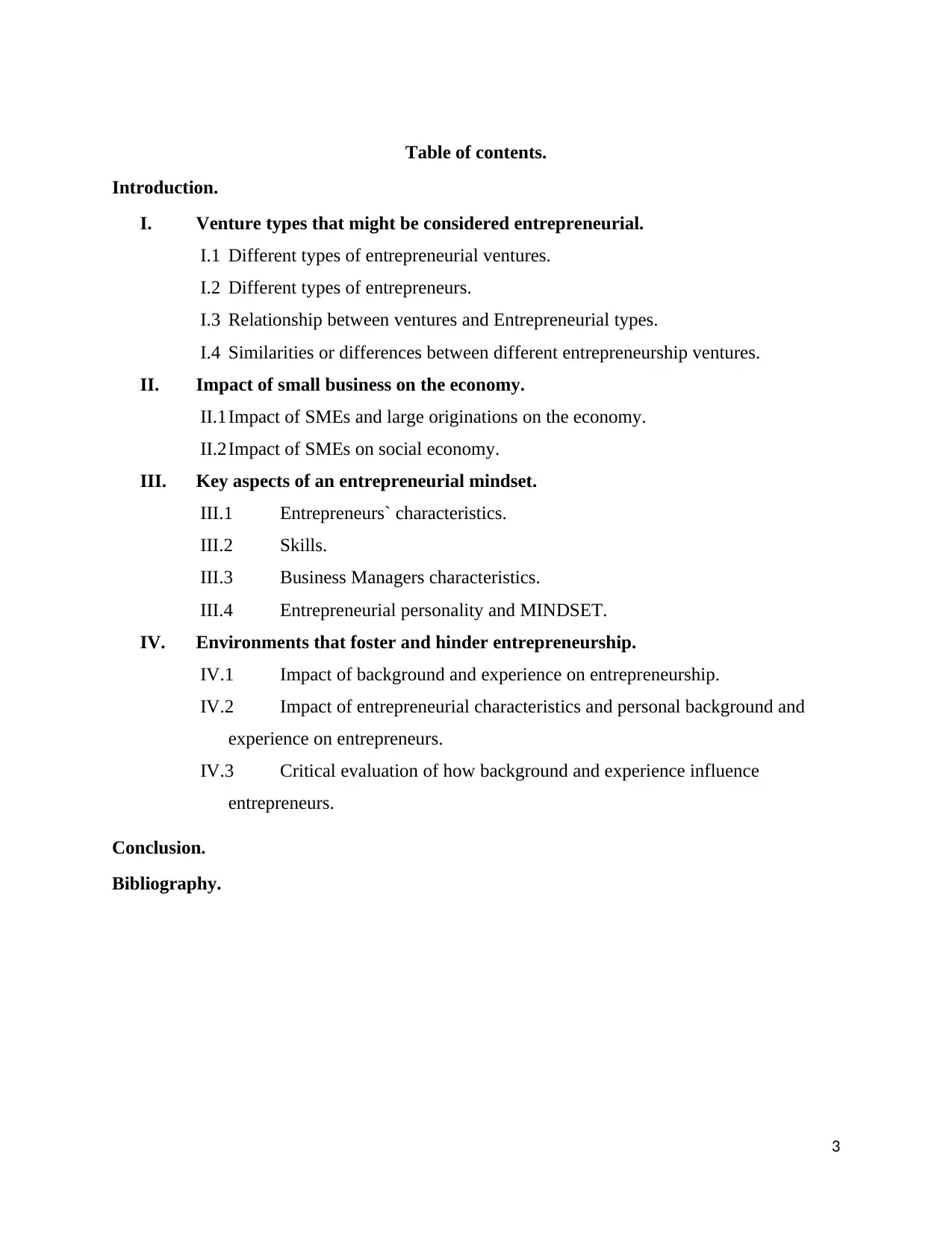
Table of contents.
Introduction.
I. Venture types that might be considered entrepreneurial.
I.1 Different types of entrepreneurial ventures.
I.2 Different types of entrepreneurs.
I.3 Relationship between ventures and Entrepreneurial types.
I.4 Similarities or differences between different entrepreneurship ventures.
II. Impact of small business on the economy.
II.1Impact of SMEs and large originations on the economy.
II.2Impact of SMEs on social economy.
III. Key aspects of an entrepreneurial mindset.
III.1 Entrepreneurs` characteristics.
III.2 Skills.
III.3 Business Managers characteristics.
III.4 Entrepreneurial personality and MINDSET.
IV. Environments that foster and hinder entrepreneurship.
IV.1 Impact of background and experience on entrepreneurship.
IV.2 Impact of entrepreneurial characteristics and personal background and
experience on entrepreneurs.
IV.3 Critical evaluation of how background and experience influence
entrepreneurs.
Conclusion.
Bibliography.
3
Introduction.
I. Venture types that might be considered entrepreneurial.
I.1 Different types of entrepreneurial ventures.
I.2 Different types of entrepreneurs.
I.3 Relationship between ventures and Entrepreneurial types.
I.4 Similarities or differences between different entrepreneurship ventures.
II. Impact of small business on the economy.
II.1Impact of SMEs and large originations on the economy.
II.2Impact of SMEs on social economy.
III. Key aspects of an entrepreneurial mindset.
III.1 Entrepreneurs` characteristics.
III.2 Skills.
III.3 Business Managers characteristics.
III.4 Entrepreneurial personality and MINDSET.
IV. Environments that foster and hinder entrepreneurship.
IV.1 Impact of background and experience on entrepreneurship.
IV.2 Impact of entrepreneurial characteristics and personal background and
experience on entrepreneurs.
IV.3 Critical evaluation of how background and experience influence
entrepreneurs.
Conclusion.
Bibliography.
3
⊘ This is a preview!⊘
Do you want full access?
Subscribe today to unlock all pages.

Trusted by 1+ million students worldwide
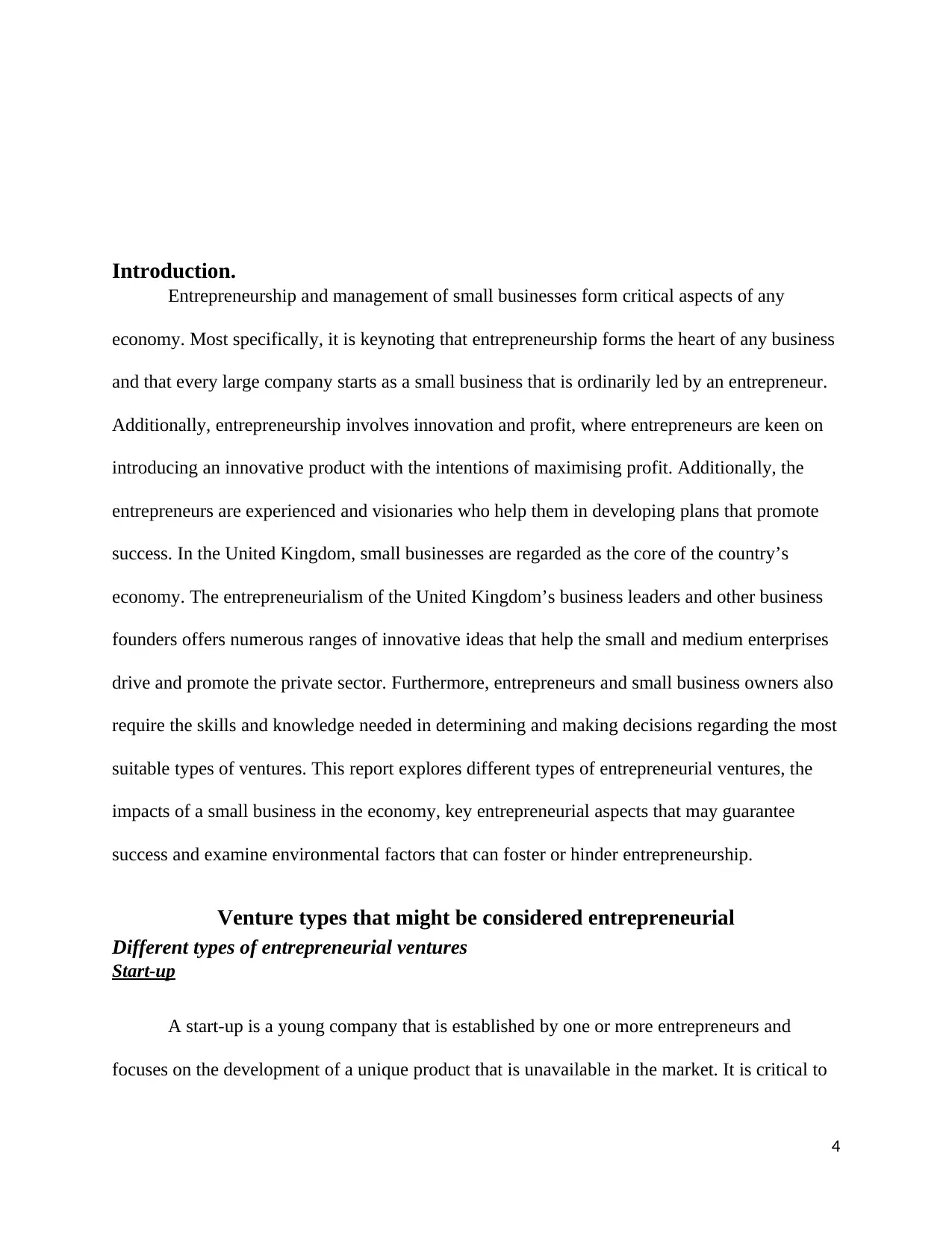
Introduction.
Entrepreneurship and management of small businesses form critical aspects of any
economy. Most specifically, it is keynoting that entrepreneurship forms the heart of any business
and that every large company starts as a small business that is ordinarily led by an entrepreneur.
Additionally, entrepreneurship involves innovation and profit, where entrepreneurs are keen on
introducing an innovative product with the intentions of maximising profit. Additionally, the
entrepreneurs are experienced and visionaries who help them in developing plans that promote
success. In the United Kingdom, small businesses are regarded as the core of the country’s
economy. The entrepreneurialism of the United Kingdom’s business leaders and other business
founders offers numerous ranges of innovative ideas that help the small and medium enterprises
drive and promote the private sector. Furthermore, entrepreneurs and small business owners also
require the skills and knowledge needed in determining and making decisions regarding the most
suitable types of ventures. This report explores different types of entrepreneurial ventures, the
impacts of a small business in the economy, key entrepreneurial aspects that may guarantee
success and examine environmental factors that can foster or hinder entrepreneurship.
Venture types that might be considered entrepreneurial
Different types of entrepreneurial ventures
Start-up
A start-up is a young company that is established by one or more entrepreneurs and
focuses on the development of a unique product that is unavailable in the market. It is critical to
4
Entrepreneurship and management of small businesses form critical aspects of any
economy. Most specifically, it is keynoting that entrepreneurship forms the heart of any business
and that every large company starts as a small business that is ordinarily led by an entrepreneur.
Additionally, entrepreneurship involves innovation and profit, where entrepreneurs are keen on
introducing an innovative product with the intentions of maximising profit. Additionally, the
entrepreneurs are experienced and visionaries who help them in developing plans that promote
success. In the United Kingdom, small businesses are regarded as the core of the country’s
economy. The entrepreneurialism of the United Kingdom’s business leaders and other business
founders offers numerous ranges of innovative ideas that help the small and medium enterprises
drive and promote the private sector. Furthermore, entrepreneurs and small business owners also
require the skills and knowledge needed in determining and making decisions regarding the most
suitable types of ventures. This report explores different types of entrepreneurial ventures, the
impacts of a small business in the economy, key entrepreneurial aspects that may guarantee
success and examine environmental factors that can foster or hinder entrepreneurship.
Venture types that might be considered entrepreneurial
Different types of entrepreneurial ventures
Start-up
A start-up is a young company that is established by one or more entrepreneurs and
focuses on the development of a unique product that is unavailable in the market. It is critical to
4
Paraphrase This Document
Need a fresh take? Get an instant paraphrase of this document with our AI Paraphraser
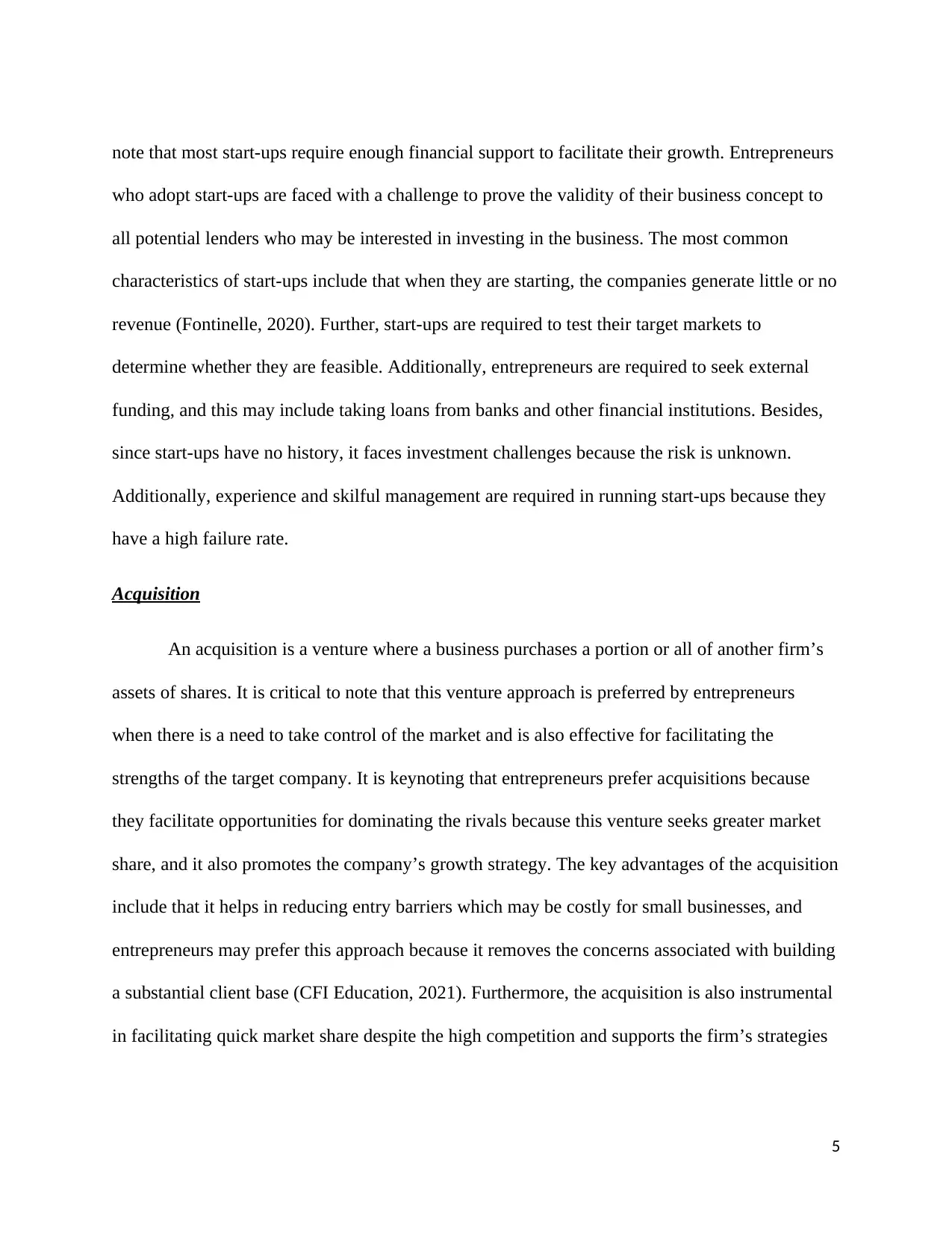
note that most start-ups require enough financial support to facilitate their growth. Entrepreneurs
who adopt start-ups are faced with a challenge to prove the validity of their business concept to
all potential lenders who may be interested in investing in the business. The most common
characteristics of start-ups include that when they are starting, the companies generate little or no
revenue (Fontinelle, 2020). Further, start-ups are required to test their target markets to
determine whether they are feasible. Additionally, entrepreneurs are required to seek external
funding, and this may include taking loans from banks and other financial institutions. Besides,
since start-ups have no history, it faces investment challenges because the risk is unknown.
Additionally, experience and skilful management are required in running start-ups because they
have a high failure rate.
Acquisition
An acquisition is a venture where a business purchases a portion or all of another firm’s
assets of shares. It is critical to note that this venture approach is preferred by entrepreneurs
when there is a need to take control of the market and is also effective for facilitating the
strengths of the target company. It is keynoting that entrepreneurs prefer acquisitions because
they facilitate opportunities for dominating the rivals because this venture seeks greater market
share, and it also promotes the company’s growth strategy. The key advantages of the acquisition
include that it helps in reducing entry barriers which may be costly for small businesses, and
entrepreneurs may prefer this approach because it removes the concerns associated with building
a substantial client base (CFI Education, 2021). Furthermore, the acquisition is also instrumental
in facilitating quick market share despite the high competition and supports the firm’s strategies
5
who adopt start-ups are faced with a challenge to prove the validity of their business concept to
all potential lenders who may be interested in investing in the business. The most common
characteristics of start-ups include that when they are starting, the companies generate little or no
revenue (Fontinelle, 2020). Further, start-ups are required to test their target markets to
determine whether they are feasible. Additionally, entrepreneurs are required to seek external
funding, and this may include taking loans from banks and other financial institutions. Besides,
since start-ups have no history, it faces investment challenges because the risk is unknown.
Additionally, experience and skilful management are required in running start-ups because they
have a high failure rate.
Acquisition
An acquisition is a venture where a business purchases a portion or all of another firm’s
assets of shares. It is critical to note that this venture approach is preferred by entrepreneurs
when there is a need to take control of the market and is also effective for facilitating the
strengths of the target company. It is keynoting that entrepreneurs prefer acquisitions because
they facilitate opportunities for dominating the rivals because this venture seeks greater market
share, and it also promotes the company’s growth strategy. The key advantages of the acquisition
include that it helps in reducing entry barriers which may be costly for small businesses, and
entrepreneurs may prefer this approach because it removes the concerns associated with building
a substantial client base (CFI Education, 2021). Furthermore, the acquisition is also instrumental
in facilitating quick market share despite the high competition and supports the firm’s strategies
5
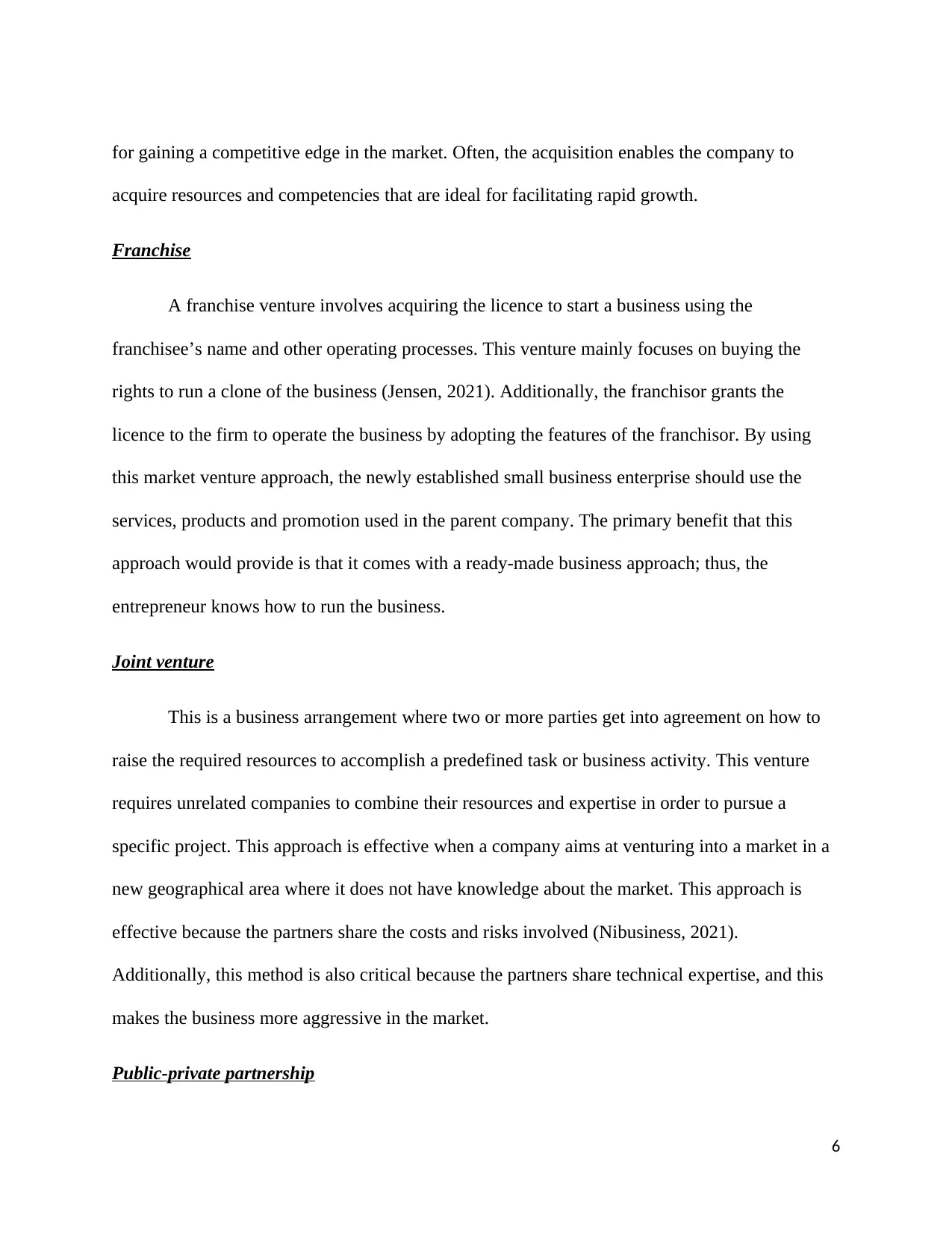
for gaining a competitive edge in the market. Often, the acquisition enables the company to
acquire resources and competencies that are ideal for facilitating rapid growth.
Franchise
A franchise venture involves acquiring the licence to start a business using the
franchisee’s name and other operating processes. This venture mainly focuses on buying the
rights to run a clone of the business (Jensen, 2021). Additionally, the franchisor grants the
licence to the firm to operate the business by adopting the features of the franchisor. By using
this market venture approach, the newly established small business enterprise should use the
services, products and promotion used in the parent company. The primary benefit that this
approach would provide is that it comes with a ready-made business approach; thus, the
entrepreneur knows how to run the business.
Joint venture
This is a business arrangement where two or more parties get into agreement on how to
raise the required resources to accomplish a predefined task or business activity. This venture
requires unrelated companies to combine their resources and expertise in order to pursue a
specific project. This approach is effective when a company aims at venturing into a market in a
new geographical area where it does not have knowledge about the market. This approach is
effective because the partners share the costs and risks involved (Nibusiness, 2021).
Additionally, this method is also critical because the partners share technical expertise, and this
makes the business more aggressive in the market.
Public-private partnership
6
acquire resources and competencies that are ideal for facilitating rapid growth.
Franchise
A franchise venture involves acquiring the licence to start a business using the
franchisee’s name and other operating processes. This venture mainly focuses on buying the
rights to run a clone of the business (Jensen, 2021). Additionally, the franchisor grants the
licence to the firm to operate the business by adopting the features of the franchisor. By using
this market venture approach, the newly established small business enterprise should use the
services, products and promotion used in the parent company. The primary benefit that this
approach would provide is that it comes with a ready-made business approach; thus, the
entrepreneur knows how to run the business.
Joint venture
This is a business arrangement where two or more parties get into agreement on how to
raise the required resources to accomplish a predefined task or business activity. This venture
requires unrelated companies to combine their resources and expertise in order to pursue a
specific project. This approach is effective when a company aims at venturing into a market in a
new geographical area where it does not have knowledge about the market. This approach is
effective because the partners share the costs and risks involved (Nibusiness, 2021).
Additionally, this method is also critical because the partners share technical expertise, and this
makes the business more aggressive in the market.
Public-private partnership
6
⊘ This is a preview!⊘
Do you want full access?
Subscribe today to unlock all pages.

Trusted by 1+ million students worldwide
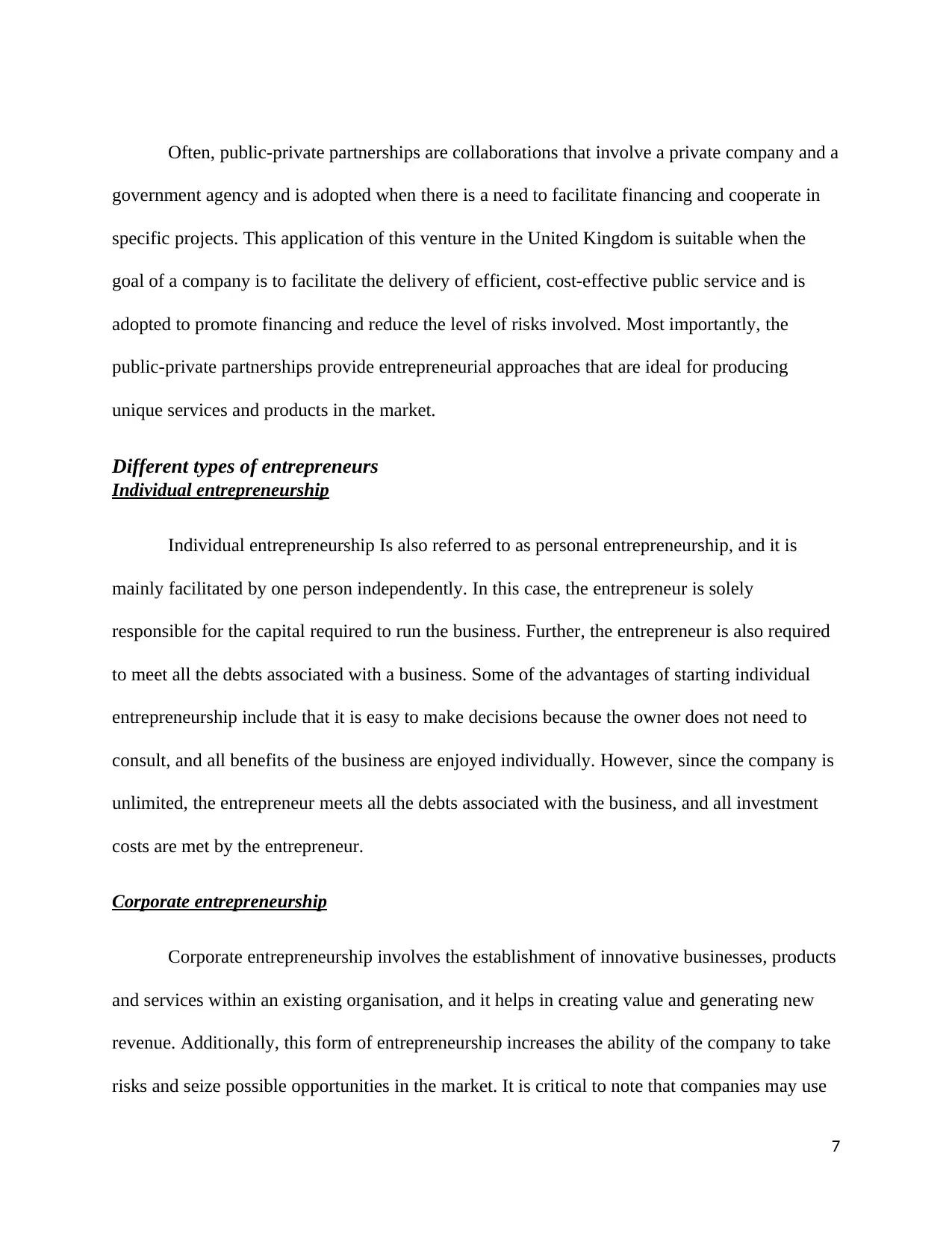
Often, public-private partnerships are collaborations that involve a private company and a
government agency and is adopted when there is a need to facilitate financing and cooperate in
specific projects. This application of this venture in the United Kingdom is suitable when the
goal of a company is to facilitate the delivery of efficient, cost-effective public service and is
adopted to promote financing and reduce the level of risks involved. Most importantly, the
public-private partnerships provide entrepreneurial approaches that are ideal for producing
unique services and products in the market.
Different types of entrepreneurs
Individual entrepreneurship
Individual entrepreneurship Is also referred to as personal entrepreneurship, and it is
mainly facilitated by one person independently. In this case, the entrepreneur is solely
responsible for the capital required to run the business. Further, the entrepreneur is also required
to meet all the debts associated with a business. Some of the advantages of starting individual
entrepreneurship include that it is easy to make decisions because the owner does not need to
consult, and all benefits of the business are enjoyed individually. However, since the company is
unlimited, the entrepreneur meets all the debts associated with the business, and all investment
costs are met by the entrepreneur.
Corporate entrepreneurship
Corporate entrepreneurship involves the establishment of innovative businesses, products
and services within an existing organisation, and it helps in creating value and generating new
revenue. Additionally, this form of entrepreneurship increases the ability of the company to take
risks and seize possible opportunities in the market. It is critical to note that companies may use
7
government agency and is adopted when there is a need to facilitate financing and cooperate in
specific projects. This application of this venture in the United Kingdom is suitable when the
goal of a company is to facilitate the delivery of efficient, cost-effective public service and is
adopted to promote financing and reduce the level of risks involved. Most importantly, the
public-private partnerships provide entrepreneurial approaches that are ideal for producing
unique services and products in the market.
Different types of entrepreneurs
Individual entrepreneurship
Individual entrepreneurship Is also referred to as personal entrepreneurship, and it is
mainly facilitated by one person independently. In this case, the entrepreneur is solely
responsible for the capital required to run the business. Further, the entrepreneur is also required
to meet all the debts associated with a business. Some of the advantages of starting individual
entrepreneurship include that it is easy to make decisions because the owner does not need to
consult, and all benefits of the business are enjoyed individually. However, since the company is
unlimited, the entrepreneur meets all the debts associated with the business, and all investment
costs are met by the entrepreneur.
Corporate entrepreneurship
Corporate entrepreneurship involves the establishment of innovative businesses, products
and services within an existing organisation, and it helps in creating value and generating new
revenue. Additionally, this form of entrepreneurship increases the ability of the company to take
risks and seize possible opportunities in the market. It is critical to note that companies may use
7
Paraphrase This Document
Need a fresh take? Get an instant paraphrase of this document with our AI Paraphraser
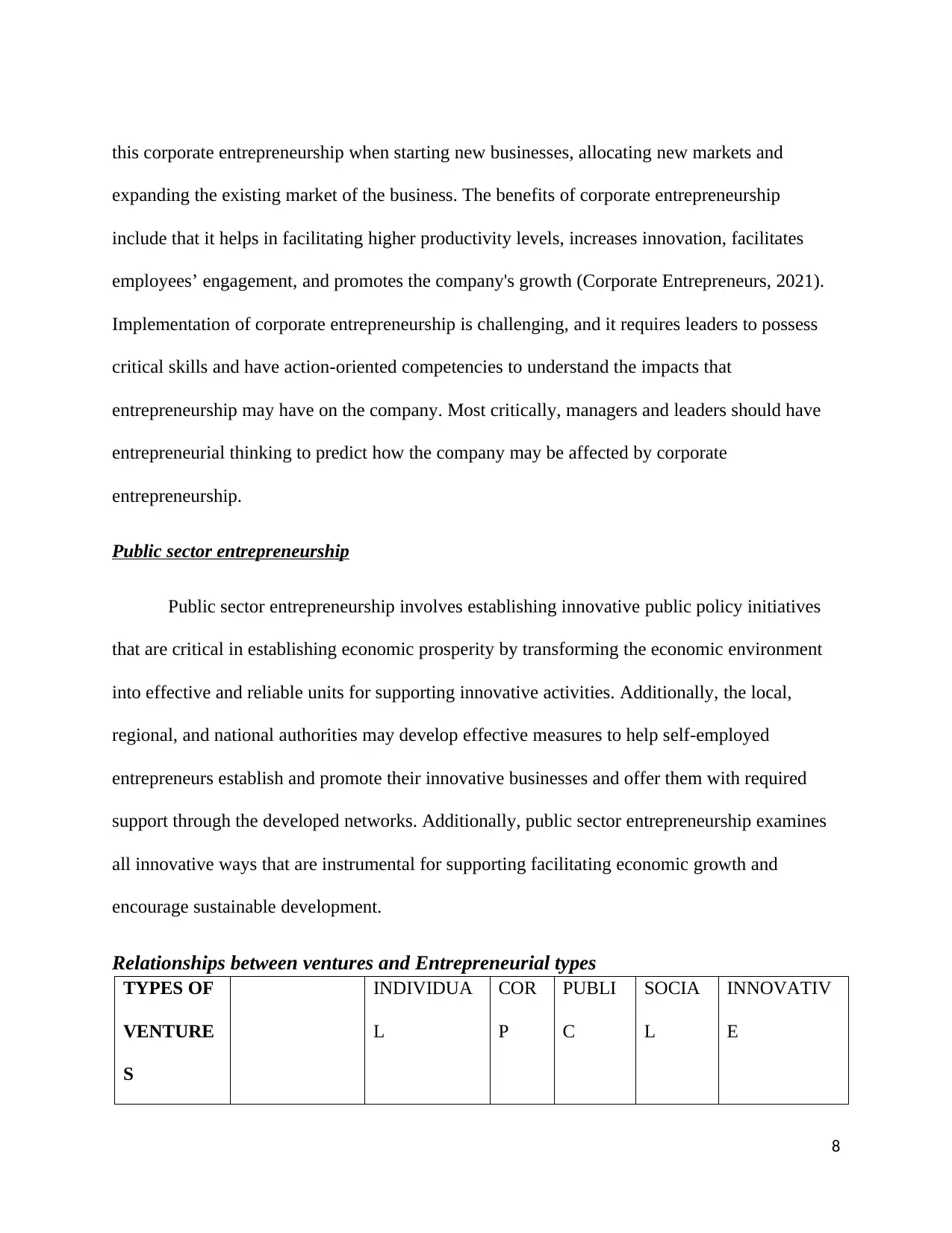
this corporate entrepreneurship when starting new businesses, allocating new markets and
expanding the existing market of the business. The benefits of corporate entrepreneurship
include that it helps in facilitating higher productivity levels, increases innovation, facilitates
employees’ engagement, and promotes the company's growth (Corporate Entrepreneurs, 2021).
Implementation of corporate entrepreneurship is challenging, and it requires leaders to possess
critical skills and have action-oriented competencies to understand the impacts that
entrepreneurship may have on the company. Most critically, managers and leaders should have
entrepreneurial thinking to predict how the company may be affected by corporate
entrepreneurship.
Public sector entrepreneurship
Public sector entrepreneurship involves establishing innovative public policy initiatives
that are critical in establishing economic prosperity by transforming the economic environment
into effective and reliable units for supporting innovative activities. Additionally, the local,
regional, and national authorities may develop effective measures to help self-employed
entrepreneurs establish and promote their innovative businesses and offer them with required
support through the developed networks. Additionally, public sector entrepreneurship examines
all innovative ways that are instrumental for supporting facilitating economic growth and
encourage sustainable development.
Relationships between ventures and Entrepreneurial types
TYPES OF
VENTURE
S
INDIVIDUA
L
COR
P
PUBLI
C
SOCIA
L
INNOVATIV
E
8
expanding the existing market of the business. The benefits of corporate entrepreneurship
include that it helps in facilitating higher productivity levels, increases innovation, facilitates
employees’ engagement, and promotes the company's growth (Corporate Entrepreneurs, 2021).
Implementation of corporate entrepreneurship is challenging, and it requires leaders to possess
critical skills and have action-oriented competencies to understand the impacts that
entrepreneurship may have on the company. Most critically, managers and leaders should have
entrepreneurial thinking to predict how the company may be affected by corporate
entrepreneurship.
Public sector entrepreneurship
Public sector entrepreneurship involves establishing innovative public policy initiatives
that are critical in establishing economic prosperity by transforming the economic environment
into effective and reliable units for supporting innovative activities. Additionally, the local,
regional, and national authorities may develop effective measures to help self-employed
entrepreneurs establish and promote their innovative businesses and offer them with required
support through the developed networks. Additionally, public sector entrepreneurship examines
all innovative ways that are instrumental for supporting facilitating economic growth and
encourage sustainable development.
Relationships between ventures and Entrepreneurial types
TYPES OF
VENTURE
S
INDIVIDUA
L
COR
P
PUBLI
C
SOCIA
L
INNOVATIV
E
8
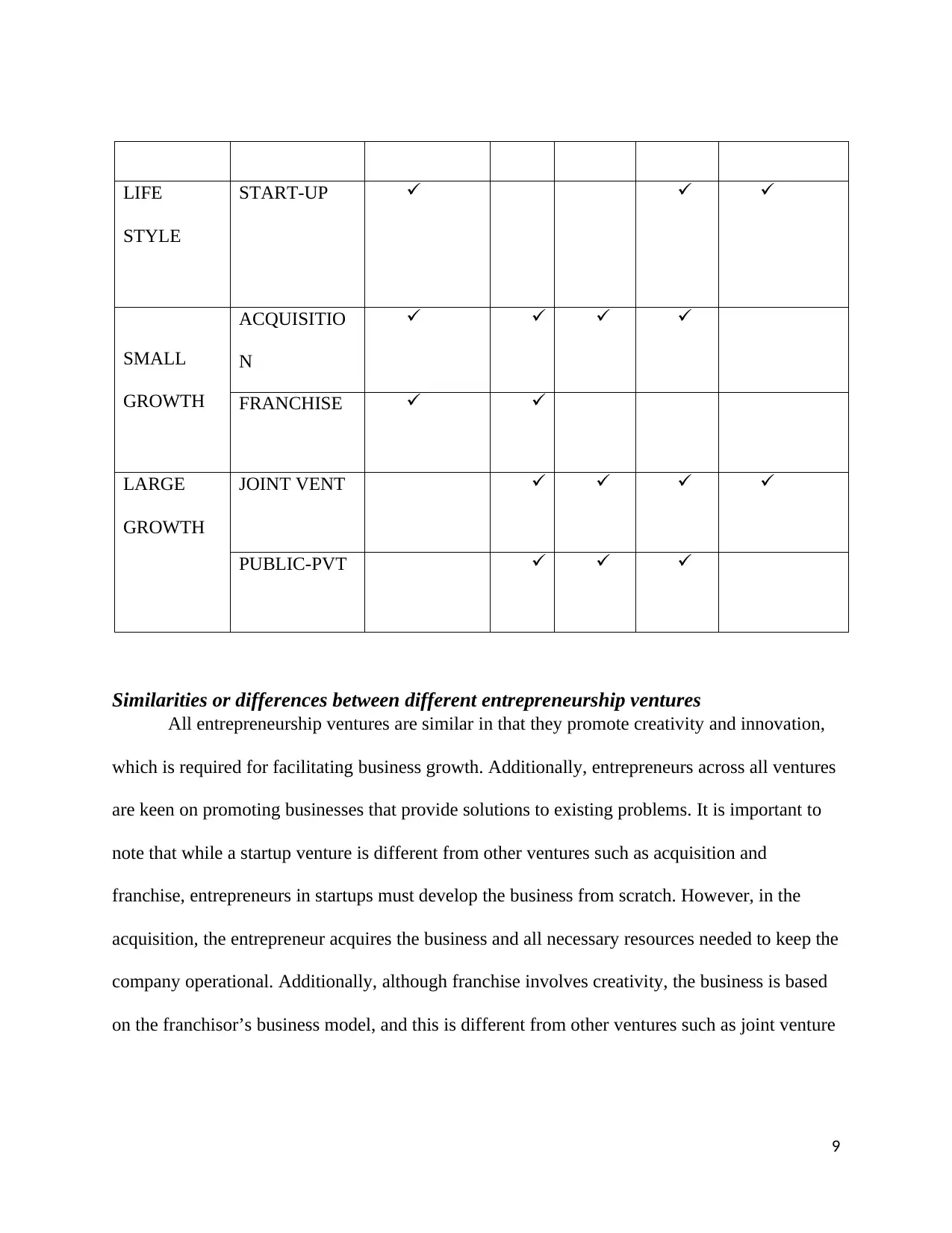
LIFE
STYLE
START-UP
SMALL
GROWTH
ACQUISITIO
N
FRANCHISE
LARGE
GROWTH
JOINT VENT
PUBLIC-PVT
Similarities or differences between different entrepreneurship ventures
All entrepreneurship ventures are similar in that they promote creativity and innovation,
which is required for facilitating business growth. Additionally, entrepreneurs across all ventures
are keen on promoting businesses that provide solutions to existing problems. It is important to
note that while a startup venture is different from other ventures such as acquisition and
franchise, entrepreneurs in startups must develop the business from scratch. However, in the
acquisition, the entrepreneur acquires the business and all necessary resources needed to keep the
company operational. Additionally, although franchise involves creativity, the business is based
on the franchisor’s business model, and this is different from other ventures such as joint venture
9
STYLE
START-UP
SMALL
GROWTH
ACQUISITIO
N
FRANCHISE
LARGE
GROWTH
JOINT VENT
PUBLIC-PVT
Similarities or differences between different entrepreneurship ventures
All entrepreneurship ventures are similar in that they promote creativity and innovation,
which is required for facilitating business growth. Additionally, entrepreneurs across all ventures
are keen on promoting businesses that provide solutions to existing problems. It is important to
note that while a startup venture is different from other ventures such as acquisition and
franchise, entrepreneurs in startups must develop the business from scratch. However, in the
acquisition, the entrepreneur acquires the business and all necessary resources needed to keep the
company operational. Additionally, although franchise involves creativity, the business is based
on the franchisor’s business model, and this is different from other ventures such as joint venture
9
⊘ This is a preview!⊘
Do you want full access?
Subscribe today to unlock all pages.

Trusted by 1+ million students worldwide
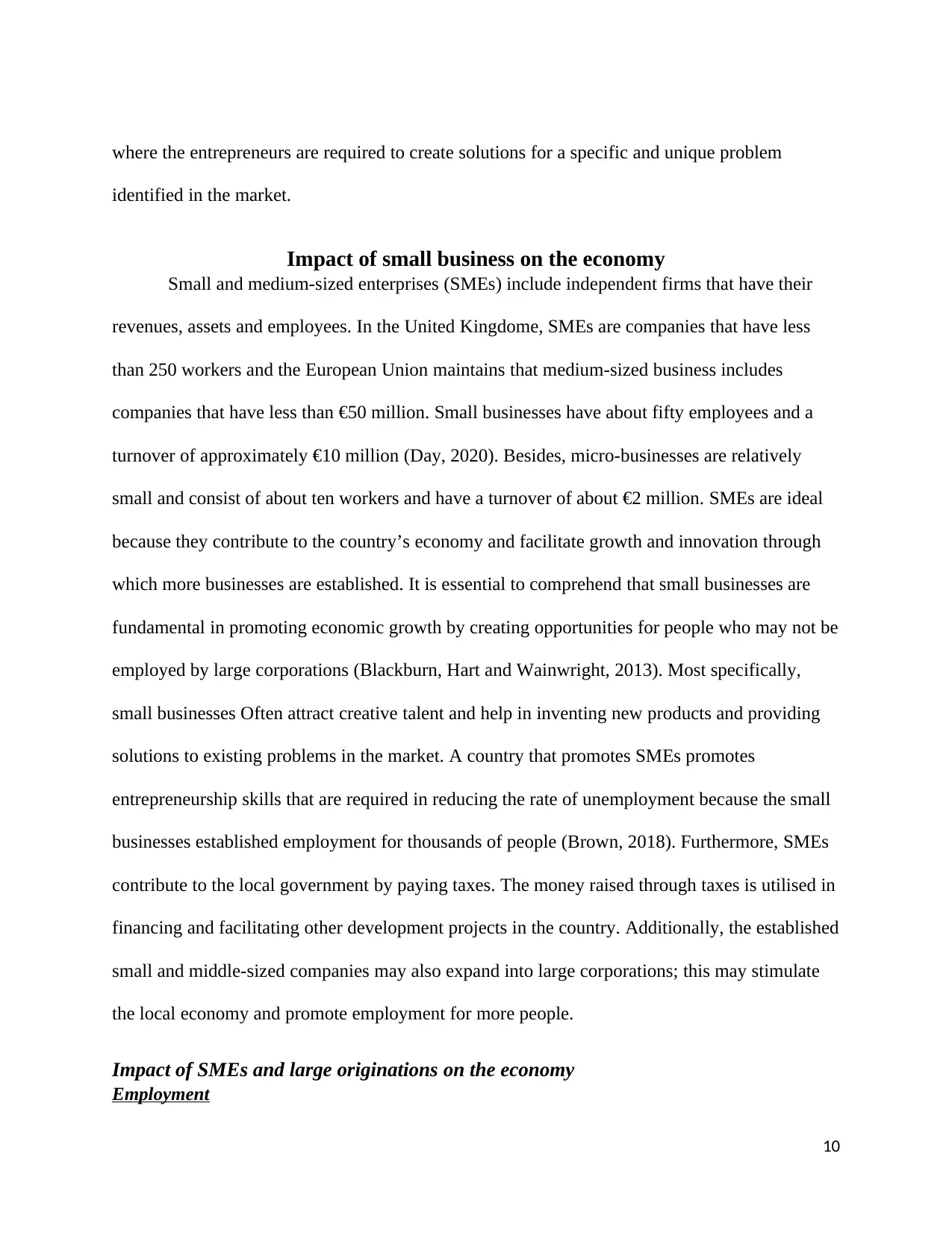
where the entrepreneurs are required to create solutions for a specific and unique problem
identified in the market.
Impact of small business on the economy
Small and medium-sized enterprises (SMEs) include independent firms that have their
revenues, assets and employees. In the United Kingdome, SMEs are companies that have less
than 250 workers and the European Union maintains that medium-sized business includes
companies that have less than €50 million. Small businesses have about fifty employees and a
turnover of approximately €10 million (Day, 2020). Besides, micro-businesses are relatively
small and consist of about ten workers and have a turnover of about €2 million. SMEs are ideal
because they contribute to the country’s economy and facilitate growth and innovation through
which more businesses are established. It is essential to comprehend that small businesses are
fundamental in promoting economic growth by creating opportunities for people who may not be
employed by large corporations (Blackburn, Hart and Wainwright, 2013). Most specifically,
small businesses Often attract creative talent and help in inventing new products and providing
solutions to existing problems in the market. A country that promotes SMEs promotes
entrepreneurship skills that are required in reducing the rate of unemployment because the small
businesses established employment for thousands of people (Brown, 2018). Furthermore, SMEs
contribute to the local government by paying taxes. The money raised through taxes is utilised in
financing and facilitating other development projects in the country. Additionally, the established
small and middle-sized companies may also expand into large corporations; this may stimulate
the local economy and promote employment for more people.
Impact of SMEs and large originations on the economy
Employment
10
identified in the market.
Impact of small business on the economy
Small and medium-sized enterprises (SMEs) include independent firms that have their
revenues, assets and employees. In the United Kingdome, SMEs are companies that have less
than 250 workers and the European Union maintains that medium-sized business includes
companies that have less than €50 million. Small businesses have about fifty employees and a
turnover of approximately €10 million (Day, 2020). Besides, micro-businesses are relatively
small and consist of about ten workers and have a turnover of about €2 million. SMEs are ideal
because they contribute to the country’s economy and facilitate growth and innovation through
which more businesses are established. It is essential to comprehend that small businesses are
fundamental in promoting economic growth by creating opportunities for people who may not be
employed by large corporations (Blackburn, Hart and Wainwright, 2013). Most specifically,
small businesses Often attract creative talent and help in inventing new products and providing
solutions to existing problems in the market. A country that promotes SMEs promotes
entrepreneurship skills that are required in reducing the rate of unemployment because the small
businesses established employment for thousands of people (Brown, 2018). Furthermore, SMEs
contribute to the local government by paying taxes. The money raised through taxes is utilised in
financing and facilitating other development projects in the country. Additionally, the established
small and middle-sized companies may also expand into large corporations; this may stimulate
the local economy and promote employment for more people.
Impact of SMEs and large originations on the economy
Employment
10
Paraphrase This Document
Need a fresh take? Get an instant paraphrase of this document with our AI Paraphraser
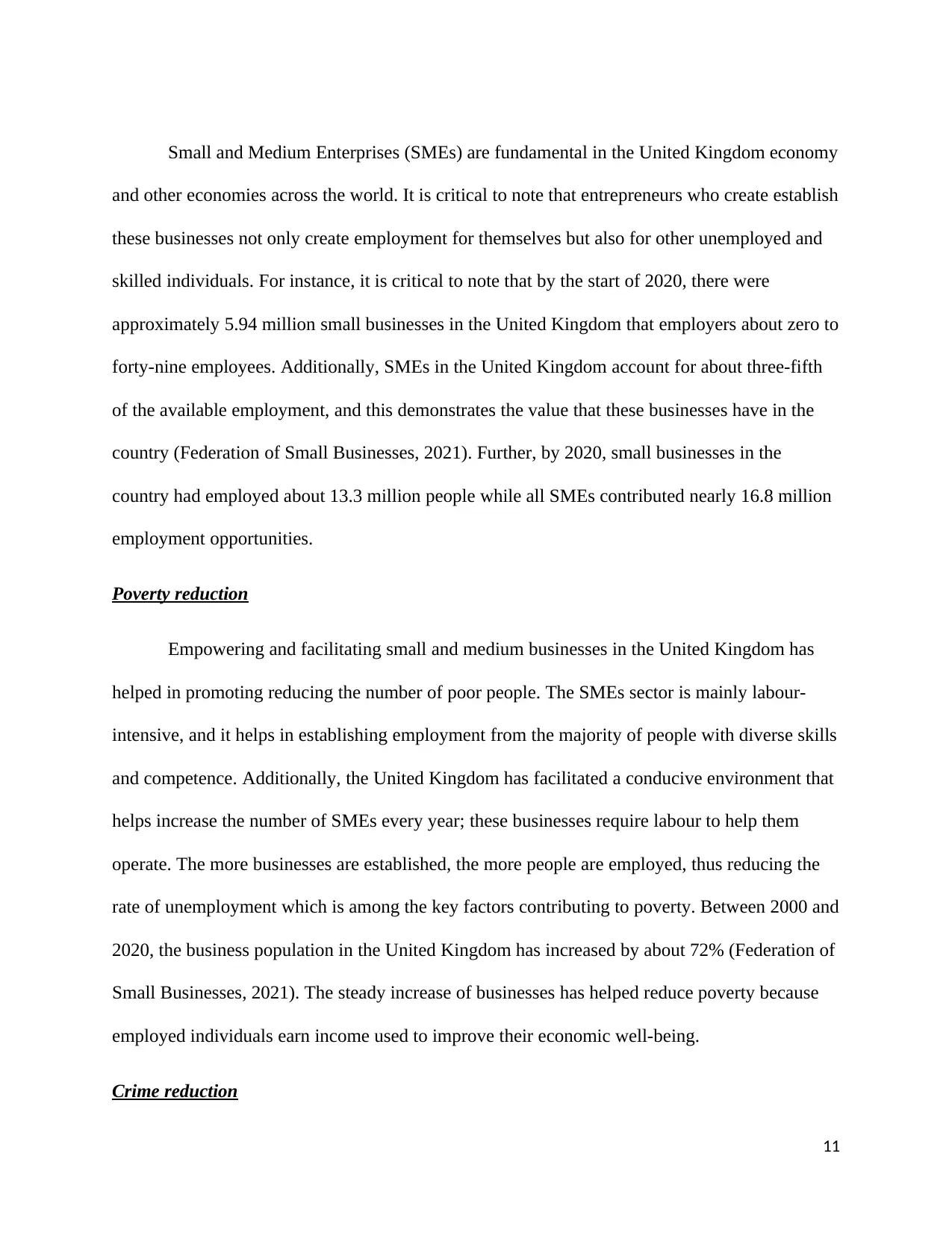
Small and Medium Enterprises (SMEs) are fundamental in the United Kingdom economy
and other economies across the world. It is critical to note that entrepreneurs who create establish
these businesses not only create employment for themselves but also for other unemployed and
skilled individuals. For instance, it is critical to note that by the start of 2020, there were
approximately 5.94 million small businesses in the United Kingdom that employers about zero to
forty-nine employees. Additionally, SMEs in the United Kingdom account for about three-fifth
of the available employment, and this demonstrates the value that these businesses have in the
country (Federation of Small Businesses, 2021). Further, by 2020, small businesses in the
country had employed about 13.3 million people while all SMEs contributed nearly 16.8 million
employment opportunities.
Poverty reduction
Empowering and facilitating small and medium businesses in the United Kingdom has
helped in promoting reducing the number of poor people. The SMEs sector is mainly labour-
intensive, and it helps in establishing employment from the majority of people with diverse skills
and competence. Additionally, the United Kingdom has facilitated a conducive environment that
helps increase the number of SMEs every year; these businesses require labour to help them
operate. The more businesses are established, the more people are employed, thus reducing the
rate of unemployment which is among the key factors contributing to poverty. Between 2000 and
2020, the business population in the United Kingdom has increased by about 72% (Federation of
Small Businesses, 2021). The steady increase of businesses has helped reduce poverty because
employed individuals earn income used to improve their economic well-being.
Crime reduction
11
and other economies across the world. It is critical to note that entrepreneurs who create establish
these businesses not only create employment for themselves but also for other unemployed and
skilled individuals. For instance, it is critical to note that by the start of 2020, there were
approximately 5.94 million small businesses in the United Kingdom that employers about zero to
forty-nine employees. Additionally, SMEs in the United Kingdom account for about three-fifth
of the available employment, and this demonstrates the value that these businesses have in the
country (Federation of Small Businesses, 2021). Further, by 2020, small businesses in the
country had employed about 13.3 million people while all SMEs contributed nearly 16.8 million
employment opportunities.
Poverty reduction
Empowering and facilitating small and medium businesses in the United Kingdom has
helped in promoting reducing the number of poor people. The SMEs sector is mainly labour-
intensive, and it helps in establishing employment from the majority of people with diverse skills
and competence. Additionally, the United Kingdom has facilitated a conducive environment that
helps increase the number of SMEs every year; these businesses require labour to help them
operate. The more businesses are established, the more people are employed, thus reducing the
rate of unemployment which is among the key factors contributing to poverty. Between 2000 and
2020, the business population in the United Kingdom has increased by about 72% (Federation of
Small Businesses, 2021). The steady increase of businesses has helped reduce poverty because
employed individuals earn income used to improve their economic well-being.
Crime reduction
11
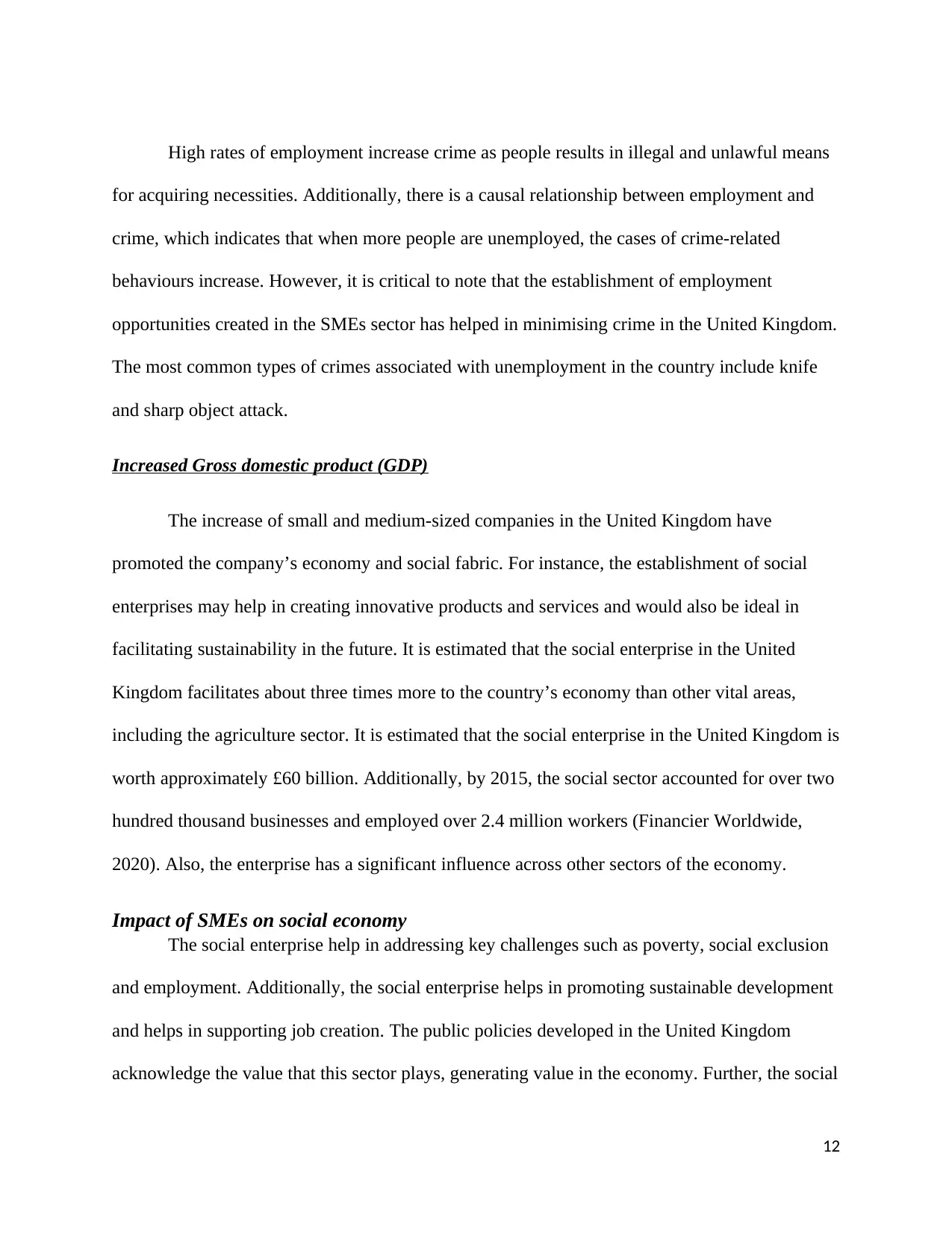
High rates of employment increase crime as people results in illegal and unlawful means
for acquiring necessities. Additionally, there is a causal relationship between employment and
crime, which indicates that when more people are unemployed, the cases of crime-related
behaviours increase. However, it is critical to note that the establishment of employment
opportunities created in the SMEs sector has helped in minimising crime in the United Kingdom.
The most common types of crimes associated with unemployment in the country include knife
and sharp object attack.
Increased Gross domestic product (GDP)
The increase of small and medium-sized companies in the United Kingdom have
promoted the company’s economy and social fabric. For instance, the establishment of social
enterprises may help in creating innovative products and services and would also be ideal in
facilitating sustainability in the future. It is estimated that the social enterprise in the United
Kingdom facilitates about three times more to the country’s economy than other vital areas,
including the agriculture sector. It is estimated that the social enterprise in the United Kingdom is
worth approximately £60 billion. Additionally, by 2015, the social sector accounted for over two
hundred thousand businesses and employed over 2.4 million workers (Financier Worldwide,
2020). Also, the enterprise has a significant influence across other sectors of the economy.
Impact of SMEs on social economy
The social enterprise help in addressing key challenges such as poverty, social exclusion
and employment. Additionally, the social enterprise helps in promoting sustainable development
and helps in supporting job creation. The public policies developed in the United Kingdom
acknowledge the value that this sector plays, generating value in the economy. Further, the social
12
for acquiring necessities. Additionally, there is a causal relationship between employment and
crime, which indicates that when more people are unemployed, the cases of crime-related
behaviours increase. However, it is critical to note that the establishment of employment
opportunities created in the SMEs sector has helped in minimising crime in the United Kingdom.
The most common types of crimes associated with unemployment in the country include knife
and sharp object attack.
Increased Gross domestic product (GDP)
The increase of small and medium-sized companies in the United Kingdom have
promoted the company’s economy and social fabric. For instance, the establishment of social
enterprises may help in creating innovative products and services and would also be ideal in
facilitating sustainability in the future. It is estimated that the social enterprise in the United
Kingdom facilitates about three times more to the country’s economy than other vital areas,
including the agriculture sector. It is estimated that the social enterprise in the United Kingdom is
worth approximately £60 billion. Additionally, by 2015, the social sector accounted for over two
hundred thousand businesses and employed over 2.4 million workers (Financier Worldwide,
2020). Also, the enterprise has a significant influence across other sectors of the economy.
Impact of SMEs on social economy
The social enterprise help in addressing key challenges such as poverty, social exclusion
and employment. Additionally, the social enterprise helps in promoting sustainable development
and helps in supporting job creation. The public policies developed in the United Kingdom
acknowledge the value that this sector plays, generating value in the economy. Further, the social
12
⊘ This is a preview!⊘
Do you want full access?
Subscribe today to unlock all pages.

Trusted by 1+ million students worldwide
1 out of 24
Related Documents
Your All-in-One AI-Powered Toolkit for Academic Success.
+13062052269
info@desklib.com
Available 24*7 on WhatsApp / Email
![[object Object]](/_next/static/media/star-bottom.7253800d.svg)
Unlock your academic potential
Copyright © 2020–2026 A2Z Services. All Rights Reserved. Developed and managed by ZUCOL.

